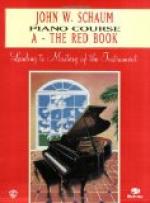“Of the classic literature, I use much Bach, when I can. I used to give more Mozart than I do now; latterly I have inclined toward Haydn; his Variations and Sonatas are fine; my students seem to prefer Haydn also. I thoroughly believe in the value of polyphonic music as a mental study; it is a necessity. And Bach is such a towering figure, such a rock of strength in musical art. Bach was essentially a Christian, and this element of devoutness, of worship, shines out in everything he wrote. I do not believe that music, without this element of worship, will live. Tschaikowsky did not have it, nor Berlioz, nor even Mozart, for Mozart wrote merely from the idea of sheer beauty of sound; in that sense he was a pagan. I doubt if Strauss has it. One cannot foresee how the future will judge the music of to-day; what will it think of Schoenberg? I am holding in abeyance any opinion I might form regarding his work till I have had more time to know it better. I can only say I have heard his string Quartet three times. The first time I found much in it to admire; the second time I was profoundly moved by certain parts of it, and on the third occasion I felt that the work, especially the latter part, contained some of the most beautiful music I had ever listened to.
“In regard to the technical training my pupils receive, it is not so easy to formulate my manner of teaching. Each pupil is a separate study, and is different from every other. As you well know, I am not a ’method man’: I have little use for the so-called piano method. To be a true teacher of the piano is a high calling indeed; for there are many pedagogues but comparatively few real teachers. I make a distinction between the two. A pedagogue is one who, filled with many rules and much learning, endeavors to pour his knowledge into the pupil; whereas the true teacher seeks to draw out what is in the pupil. He strives to find what the pupil has aptitude for, what he likes to do and can do best. The teacher must be something of a psychologist, or how can he correctly judge of the pupil’s temperament, his tastes, his mentality, and what to do for him?




